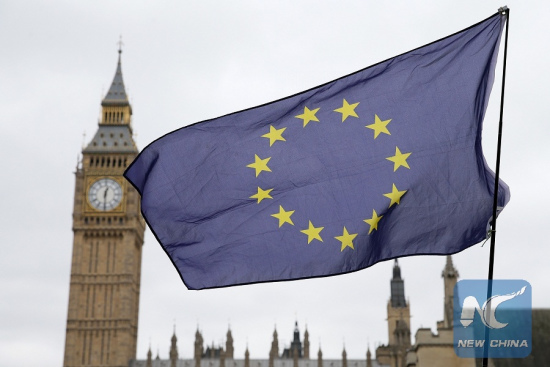
An EU flag is seen outside the the Houses of Parliament in London, Britain on March 29, 2017. (Xinhua/Tim Ireland)
As different factions and parties scramble within Britain and Europe to prepare for the imminent Brexit negotiations, the stark reality of the British decision to leave the European Union (EU) is finally making itself known.
British businesses are concerned about the prospects of a post-EU economy, and Britain's bargaining power has already shown itself to be limited.
With rumors of major investment banks Lloyd's of London and JP Morgan considering new offices in Brussels and Dublin respectively, observers are wondering about the impact of the divorce on the City of London financial industry.
Other important sectors that have drawn on EU freedom of movement to employ talent from abroad and access the single market are also considering moves, with the games industry association Ukie reporting that up to 40 percent of the British games industry may shift to Europe, according to a survey they conducted.
The economic worries seem to be reflected in credit agency Standard & Poor's position, given to Reuters on Thursday, that there was no reason to reassess its "negative outlook" on the British economy that has held since June 27, the day after Brexit, when the agency stripped the country of its choice AAA credit rating.
But potentially the biggest reality check following Theresa May's Wednesday letter that triggered Article 50 of the Lisbon Treaty and formally launched the two-year exit negotiation process, is that the UK is now in its least autonomous and potentially weakest bargaining position since it first joined the EU.
This paradoxical situation was given voice in a Wednesday press conference at the European Parliament when a Dutch journalist asked a question that might have seemed premature or overly hopeful: now that Article 50 had been invoked, was there any foreseeable way for the decision to be reversed?
Guy Verhofstadt, former prime minister of Belgium and European Parliament coordinator for Brexit, gave a revealing answer: "In our resolution, we recognize that a change of heart is possible, but...this would require the agreement of the other 27 member states, because it would no longer be a unilateral process. Once Article 50 has been notified, then the United Kingdom and all other member states of the European Union are involved."
Whereas Britain has, until now, enjoyed the relative freedom to act unilaterally -- to consult experts, to campaign for or against Europe, to stage a referendum, to debate how to proceed following the results -- that time has ended starkly, even as Brexit supporters celebrate their supposed emancipation.
One could be forgiven for thinking that, by choosing when to notify the EU of its decision and having the prerogative to launch the negotiation process, Britain might still have a certain advantage. Indeed, Prime Minister May did use her letter to propose a set of principles for the coming negotiations, and to press for certain objectives, such as the tabling of a comprehensive and ambitious trade agreement simultaneous with exit negotiations.
But now there are 28 parties to the negotiations, with the 27 remaining EU member states agreeing to act as one, according to a European Council statement on Wednesday, and Britain will not find this to be an easy task.
Wednesday evening, German Chancellor Merkel wasted no time in demonstrating the Brexit negotiations would not be like a chess match, where, between two evenly matched sides, one player has the slight advantage of moving first.
Referring to the uncertain terms of British withdrawal from the EU, the chancellor declared: "Only when those questions have been settled, which will still be hopefully soon, can we then start to talk about our future relationship."
The European Parliament, which will have to approve any final agreement on Brexit terms, went further, stating in a draft resolution that a future relationship could not be concluded until "the UK has actually left the EU."
While stressing that their priority is to protect the rights of citizens, Members of European Parliament have argued that the exit procedure comes first.
"An orderly exit is absolute requirement and the precondition for any potential future United Kingdom -- European Union relationship," declared European Parliament President Antonio Tajani on Wednesday, before insisting, "this is not negotiable."
Among the terms of the exit to be decided are financial concerns, with Britain potentially responsible for as much as 60 billion euros (64 billion U.S. dollars) in funding commitments it has previously made to EU programs.
European leaders have soundly and repeatedly made it clear that if a Brexit deal fails to be reached, the consequences would be negative for everyone, but most of all for Britain. At the same time, they have sharply criticized any hint that either security and defense cooperation, or the rights of EU and British citizens should be used as bargaining leverage in the negotiations.
Even in the best-case scenario, the resulting relationship will not be ideal. The terms of being outside the EU cannot be better than the terms of being a member state, we have been reminded again and again by European leaders.
So Britain is left with few choices. May can choose to negotiate in good faith, accepting that no free trade agreement will be met until Britain has formally left the EU, or she can lead her country to the hardest of Brexits, which would sow deep divisions between Britain and its largest global trading partners.


















































